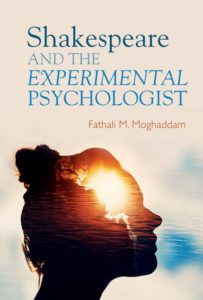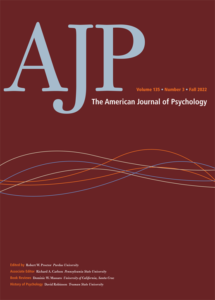Cambridge University Press released a book last year entitled Shakespeare and the Experimental Psychologist, written by Fathali M. Moghaddam, a psychologist at Georgetown University. This book seemed perfectly targeted to me. By day, I am a research psychologist and have published over 60 scholarly articles. At night, I am a theatre critic and self-avowed “Shakespeare fanboy.” I decided to review the book for a scholarly journal because the number of people qualified to judge this book is not very large. If I didn’t review it, who would?
That review was published today in The American Journal of Psychology (Warne, 2022). The review itself is behind a paywall, but anyone who wants a full copy can ask for one by emailing me. Here, I summarize the main points of Moghaddam’s (2021) book and give my assessment of it here.
Moghaddam’s Argument
 In short, Moghaddam (2021) states that in some of his plays, Shakespeare conducts thought experiments in order to demonstrate important characteristics about human behavior to his audience. According to Moghaddam, Shakespeare’s thought experiments provide valuable insight into human behavior. Employing the thought experiment in this way helped propel the world towards a modern and more scientific mode of thought.
In short, Moghaddam (2021) states that in some of his plays, Shakespeare conducts thought experiments in order to demonstrate important characteristics about human behavior to his audience. According to Moghaddam, Shakespeare’s thought experiments provide valuable insight into human behavior. Employing the thought experiment in this way helped propel the world towards a modern and more scientific mode of thought.
Moghaddam (2021) says there are two types of thought experiments in Shakespeare’s works. The first is the play within a play, which allows characters to set up a controlled environment in which they can explore human behavior. Hamlet and Henry IV, Part 1 are plays that Moghaddam says demonstrate this type of thought experiment. The second type of thought experiment occurs when Shakespeare causes change in environment or context in order to show how that changes the characters’ behavior. Moghaddam says that The Tempest, As You Like It, King Lear, Othello, Richard III, Macbeth, and Julius Caesar are all examples of the second type of thought experiment.
Moghaddam argues that as thought experiments, Shakespeare’s plays are a vital part of the turn from medieval to modern thought in the arts and sciences. Shakespeare’s works even prepared for the development of democracy and scientific thought. With a proper appreciation of Shakespeare’s thought experiments, scientists can examine other works of literature, and “English literature can reestablish its central role within the arts and sciences” (Moghaddam, 2021, p. 193).
Assessment

As I state in the review, I do not find Moghaddam’s (2021) arguments persuasive. With a strict word limit, it was not possible for me to delve into all of my disagreements in the review (Warne, 2022). But, I will discuss some of them here.
First, Moghaddam has a very Whiggish view of history, seeing Shakespeare’s works as part of a history that unfolds with an endpoint in mind. In his view, Shakespeare’s works build democracy, advance science, and helps create the modern world. But Shakespeare didn’t do any of these things. No one takes a vote in a Shakespeare play. No one collects and analyzes data with a control group. Moghaddam often misreads Shakespeare’s plays in this way.
Moghaddam also often falls into the common trap of gleaning clues to Shakespeare’s biography by reading the plays. For example, Moghaddam states the old idea that Shakespeare wrote Hamlet to deal with his grief of his father and son, the latter of whom was named Hamnet. In reality, the Hamlet story had existed for hundreds of years before Shakespeare —including as a now-lost play in 1590s London — and the two names are not linguistically related. (Shakespeare’s son and his twin sister Judith were almost certainly named after his friends, Hamnet and Judith Sadler.) There’s no evidence that family members’ deaths prompted Shakespeare to write Hamlet. Autobiographical suppositions like this have led people astray with foolish ideas about Shakespeare for decades.
From a scientific perspective, Moghaddam is on unstable ground. He refers often to shaky or discredited ideas, such as “embodied cognition,” psychoanalysis, or the claim that stable personality traits don’t exist. In Moghaddam’s view, Richard III or Macbeth are not evil; they are innocent victims of an environment that made them do bad things. This robs Shakespeare’s characters of any uniqueness in their personality or any responsibility for their deeds.
I concluded the review with the following judgement:
A reader of Shakespeare and the Experimental Psychologist will actually learn little about Shakespeare or psychology. The book reveals far more about its author (e.g., his concern about authoritarianism, his enthusiasm for social psychology) than about either of its putative topics.
I invite readers to check out the review for themselves. Shakespeare and the Scientific Psychologist is published by Cambridge University Press and can be purchased from the publisher, at Amazon, or elsewhere.
[box]
References
Moghaddam, F. M. (2021). Shakespeare and the experimental psychologist. Cambridge University Press.
Warne, R. T. (2022). Thinking does not make it so [Review of Shakespeare and the experimental psychologist by F. M. Moghaddam]. The American Journal of Psychology, 135(3), 362-364. https://doi.org/10.5406/19398298.135.3.12
[/box]
